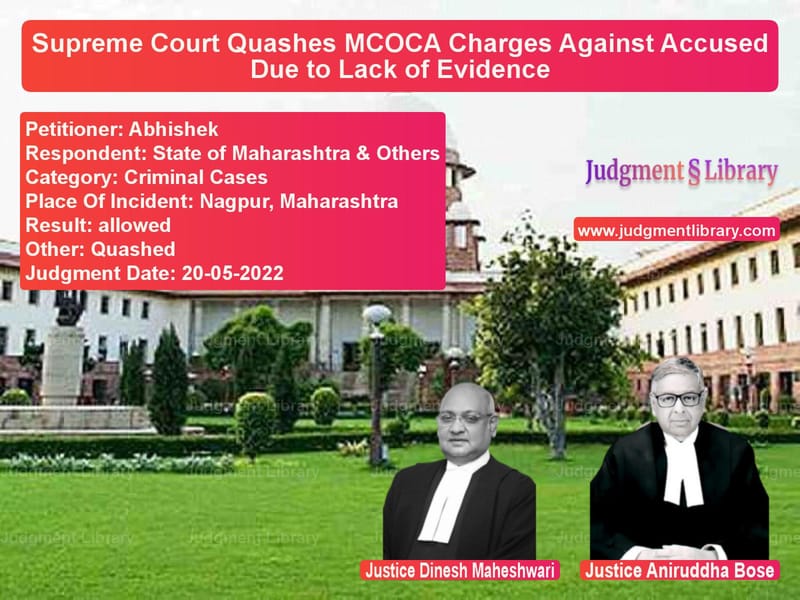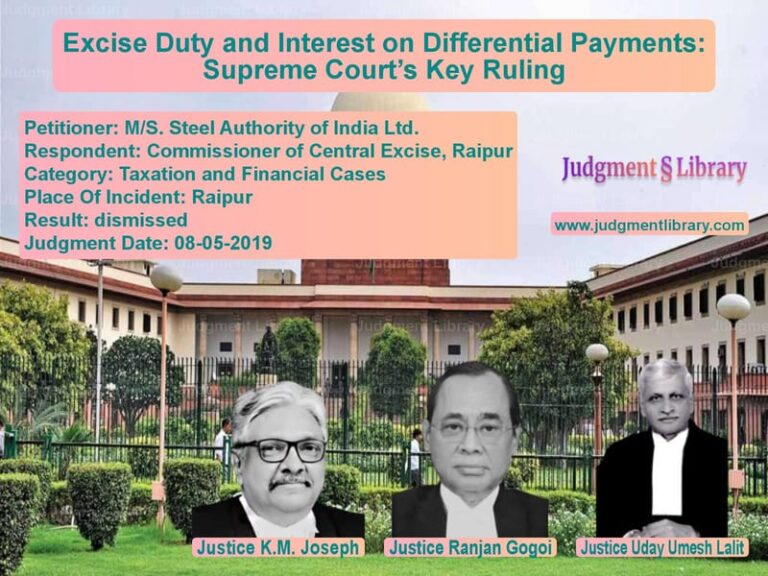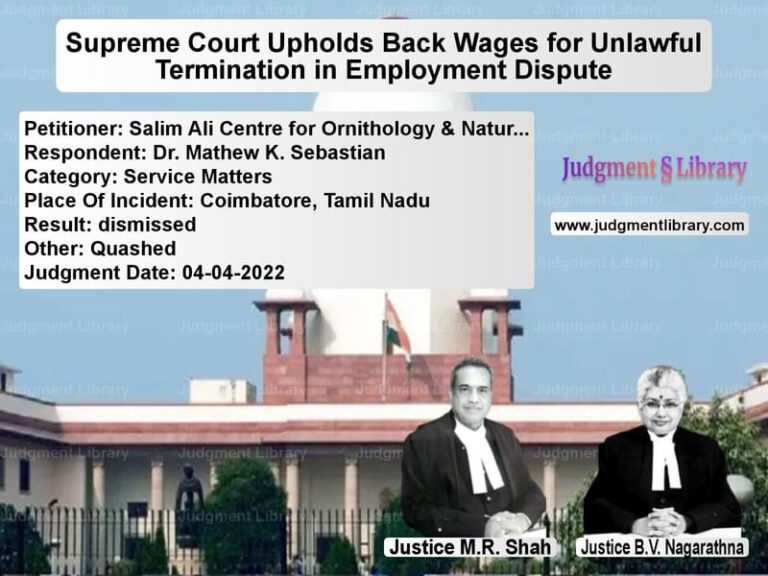Supreme Court Quashes MCOCA Charges Against Accused Due to Lack of Evidence
The Supreme Court of India has delivered a significant judgment in the case of Abhishek vs. State of Maharashtra, where it ruled that the application of the Maharashtra Control of Organised Crime Act, 1999 (MCOCA) was unjustified. The Court overturned the decision of the Bombay High Court, which had upheld the sanction for prosecution under MCOCA, citing insufficient evidence to establish the existence of an organized crime syndicate.
Background of the Case
The case arose from a complaint filed on May 8, 2020, at the Sadar Police Station in Nagpur, Maharashtra. The complainant alleged that he had been forcefully kidnapped on May 2, 2019, threatened with a knife, and asked to pay a ransom of ₹20 lakh. Among the accused were Abhishek Singh, Ankit Pali, and Roshan Sheikh, who allegedly threatened the complainant to hand over his ancestral property and a shop.
The sequence of legal events is as follows:
- May 8, 2020: An FIR was registered under Sections 363, 364A, 384, 386, 387, 397, and 504 of the IPC.
- May 11, 2020: The Sessions Judge in Nagpur granted interim bail to Abhishek Singh.
- June 2, 2020: The Additional Commissioner of Police (Crime) granted approval for the addition of Sections 3(1)(ii), 3(2), and 3(4) of MCOCA.
- November 5, 2020: The Additional Director General of Police granted sanction under Section 23(2) of MCOCA, enabling prosecution.
- December 16, 2021: The Bombay High Court rejected the appellant’s challenge to the MCOCA sanction.
- May 20, 2022: The Supreme Court overturned the High Court’s ruling, quashing the MCOCA charges.
Key Legal Issues
- Whether the accused met the threshold requirements of MCOCA, particularly the definition of an organized crime syndicate.
- Whether the previous criminal records of the accused justified the application of MCOCA.
- Whether the authorities correctly applied their discretion in granting sanction for prosecution.
Arguments by the Petitioner (Abhishek)
The petitioner, represented by senior counsel, argued that:
- The High Court erred in treating multiple FIRs as evidence of a continuing unlawful activity.
- Not all previous cases involved economic gains, which is a requirement for MCOCA applicability.
- Two of the cases cited in the MCOCA sanction order had resulted in acquittal or quashing by the High Court.
- Preventive measures taken against the accused did not demonstrate any organized criminal activity.
Counterarguments by the Respondent (State of Maharashtra)
The Maharashtra government contended that:
- Abhishek Singh was part of an organized crime syndicate, led by Roshan Sheikh.
- More than one charge sheet had been filed against the accused, fulfilling MCOCA requirements.
- The accused had engaged in violent crimes, extortion, and intimidation for financial gain.
- The confessional statements of co-accused members corroborated the prosecution’s case.
Supreme Court’s Observations
1. Failure to Establish an Organized Crime Syndicate
“The sanctioning authority failed to demonstrate that the accused acted as part of a structured crime syndicate, a crucial prerequisite for MCOCA.”
The Court emphasized that MCOCA applies only when crimes are committed by an identifiable syndicate with a pattern of economic advantage.
2. No Evidence of Pecuniary Benefit
“While the alleged offenses include violent acts, there is no evidence linking them to financial or economic benefits as required under MCOCA.”
The Court noted that previous cases involving Abhishek did not demonstrate a consistent pattern of financial crimes.
3. Confessions Cannot Be the Sole Basis for MCOCA Application
“Confessional statements under Section 18 of MCOCA cannot override the requirement of independent evidence establishing an organized crime syndicate.”
The Court ruled that confessions of co-accused members did not constitute sufficient grounds for applying MCOCA.
Final Judgment
The Supreme Court ruled:
- The sanction under MCOCA was quashed, and all MCOCA charges against Abhishek were dropped.
- The other charges under the IPC and Arms Act would proceed as per regular criminal law.
- The Bombay High Court’s ruling was overturned.
- Authorities were directed to process the case in accordance with the Indian Penal Code.
Impact of the Judgment
This ruling has several significant implications:
- Stronger Burden of Proof for MCOCA: The judgment reaffirms that mere criminal history does not justify MCOCA charges.
- Protection Against Arbitrary Prosecution: Citizens cannot be prosecuted under stringent laws without clear evidence.
- Limitation on Confessional Statements: The ruling restricts the use of confessions as the primary basis for MCOCA applicability.
- Guidelines for Law Enforcement: The judgment establishes a higher standard for sanctioning authorities in organized crime cases.
With this ruling, the Supreme Court has reinforced the principle that extraordinary laws like MCOCA must be applied cautiously, ensuring that procedural safeguards are followed to prevent misuse.
Petitioner Name: Abhishek.Respondent Name: State of Maharashtra & Others.Judgment By: Justice Dinesh Maheshwari, Justice Aniruddha Bose.Place Of Incident: Nagpur, Maharashtra.Judgment Date: 20-05-2022.
Don’t miss out on the full details! Download the complete judgment in PDF format below and gain valuable insights instantly!
Download Judgment: abhishek-vs-state-of-maharashtra-supreme-court-of-india-judgment-dated-20-05-2022.pdf
Directly Download Judgment: Directly download this Judgment
See all petitions in Bail and Anticipatory Bail
See all petitions in Extortion and Blackmail
See all petitions in Fraud and Forgery
See all petitions in Judgment by Dinesh Maheshwari
See all petitions in Judgment by Aniruddha Bose
See all petitions in allowed
See all petitions in Quashed
See all petitions in supreme court of India judgments May 2022
See all petitions in 2022 judgments
See all posts in Criminal Cases Category
See all allowed petitions in Criminal Cases Category
See all Dismissed petitions in Criminal Cases Category
See all partially allowed petitions in Criminal Cases Category







